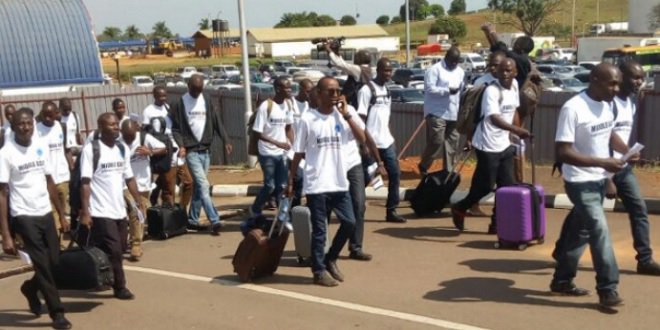Gov’t asked to regulate externalization of Ugandan labor force
She said that people working in foreign countries are under the ministry of foreign affairs, which is directly responsible, but they intervene to rescue them on request by the government.

Masindi: The government of Uganda has been called on to formulate good policies regulating the externalization of labor amidst increasing cases of human rights abuse by foreign employers, most especially in the Arab world, where Ugandans have been hired to provide labor.
The call was made by Geoffrey Kiiza Bigabwa, the secretary for production Masindi district local government, while closing a half-day workshop that was organized by the ministry of gender labor and social development together with the International Organization for Migration (IOM) and Uganda External Association and Recruitment Agency (UEARA) at Masindi district council chamber on Thursday.
Bigabwa stressed that many Ugandans employed in diaspora have been tortured, not paid, and persecuted, their rights abused, hence a need for the government to guarantee the lives of every Ugandan.
He expressed his concern for Ugandans who have suffered at the expense of their employers in foreign countries and implored the ministry of labor to ensure strict adherence to the guidelines provided.
Bigabwa further challenged the ministry of labor to formulate regulations that will ensure that Ugandans are employed within the country other than being persecuted in foreign countries on the pretext of being employed there.
Silver Mukeele, an official from the ministry of gender labor and social development, said the government has noted all the concerns that were raised by participants, and reviews of national employment policy are ongoing.
Ronnie Mukundane, an official from the Uganda External Association and Recruitment Agency, which regulates labor export companies, said that, out of three bilateral labor agreements signed by the government of Uganda, it is only one agreement with the United Arab Emirates that is being enforced.
Victoria Vanny Nabiteeko, national program officer with IOM, said that people working in foreign countries are under the ministry of foreign affairs, which is directly responsible, but they intervene to rescue them on request by the government.
Do you have an advertisement or article you want to publish? Mail us at theugreports@gmail.com or WhatsApp +256394700683.






